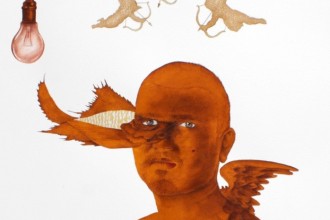“People confuse editing with publishing,†Ms. Saiyid says with a pained smile. “Publishing involves commissioning people to write, to research the market about what people want to read.†There’s also the process of proofreading and the illustration of books. But, Ms. Saiyid cautions, it isn’t until the book is marketed that the real work begins, when the book has to publicized and hyped so people want to read it.
It was this that inspired Ms. Saiyid to create the Karachi Literature Festival (KLF), the seeds for which were planted when she attended India’s Jaipur Literary Festival. In 2010, Ms. Saiyid’s dream of a large-scale platform for “creating hype about books and writing†was realized in an event that attracted 5,000 people to the Carlton Hotel in Karachi. The years that followed saw the crowds swell and in an attempt to accommodate the overwhelming interest, 2013’s festival was expanded to three days instead of two and came with a change in venue to what Ms. Saiyid hoped would be the more accessible Beach Luxury Hotel in the heart of the cosmopolitan city.
Though KLF and the museum deal principally with traditional paper-bound publishing, OUPP has not been left behind in today’s digital age of e-books perpetuated by Amazon’s Kindle and Apple’s iPad. Ms. Saiyid revealed that OUPP has started marketing children’s DVDs with interactive activities and games based on learning and reading. The future looks bright when Ms. Saiyid promises collaborating with Converge to digitize books now out of print, which would result in Oxford University Press being the first publisher in Pakistan to make e-books locally available.
Of course, the obvious question that leaps to mind when talk turns to books, reading and more importantly a literature festival emblematic of these seemingly hidden activities in today’s youth steeped as they may be in online social media, is what place does it really hold? After all, it is far more difficult today than it was 20 years ago to inculcate reading habits in children. There are just too many cartoons and video games competing with a child’s imagination to take them away from the beauty of reading and intellectual pursuits. But Ms. Saiyid seems to have an answer to everything when she points to the Children’s Literature Festivals (CLF) OUPP has been holding for the last two years. The first was held in Lahore in November 2011, where 20,000 children attended defying OUPP’s modest expectations. Quetta’s CLF in 2012 brought with it its own concerns that for the first time had nothing to do with reading habits. “We were very concerned about security because of the political situation there,†Ms. Saiyid remembers. So security was tight, which meant that this CLF was “invite-only and people could only attend with their children. We sent out invitations especially to schoolsâ€, and while Ms. Saiyid admits to feeling guilty for the extensive measures, considering that it was a one-day children’s festival only, the measures were necessary. “We took along a clown and puppet theatre,†Ms. Saiyid recalls fondly. “The children had never seen a clown, and kept running after him, they were mad with excitement.†Over 7,000 children attended, which Ms. Saiyid considers an achievement considering the strict protocols. Another CLF was held in Peshawar in November 2012.
Ms. Saiyid’s dedication to the lost art of reading doesn’t end there and OUPP hopes to reach children through its “Dosti Kitabon Se†program which it collaborated on with musician and TV personality, Khaled Anam. The reading program encourages children to “befriend†a book which brings Carlos Ruiz Zafon’s “Cemetery of Forgotten Books†to mind. Future plans include launching a mobile library for underprivileged children, an initiative that OUPP Museum curator Varda Nisar will mobilize and implement. Ms. Saiyid remains optimistic and still as doggedly persistent as ever.
Ghausia Rashid Salam is Assistant to the Editor-in-Chief and is The Missing Slate’s secret weapon. She resides on the internet where she can be found tweeting, blogging, sharing photos of cats and food, and every now and then, expressing serious opinions on various subjects.




